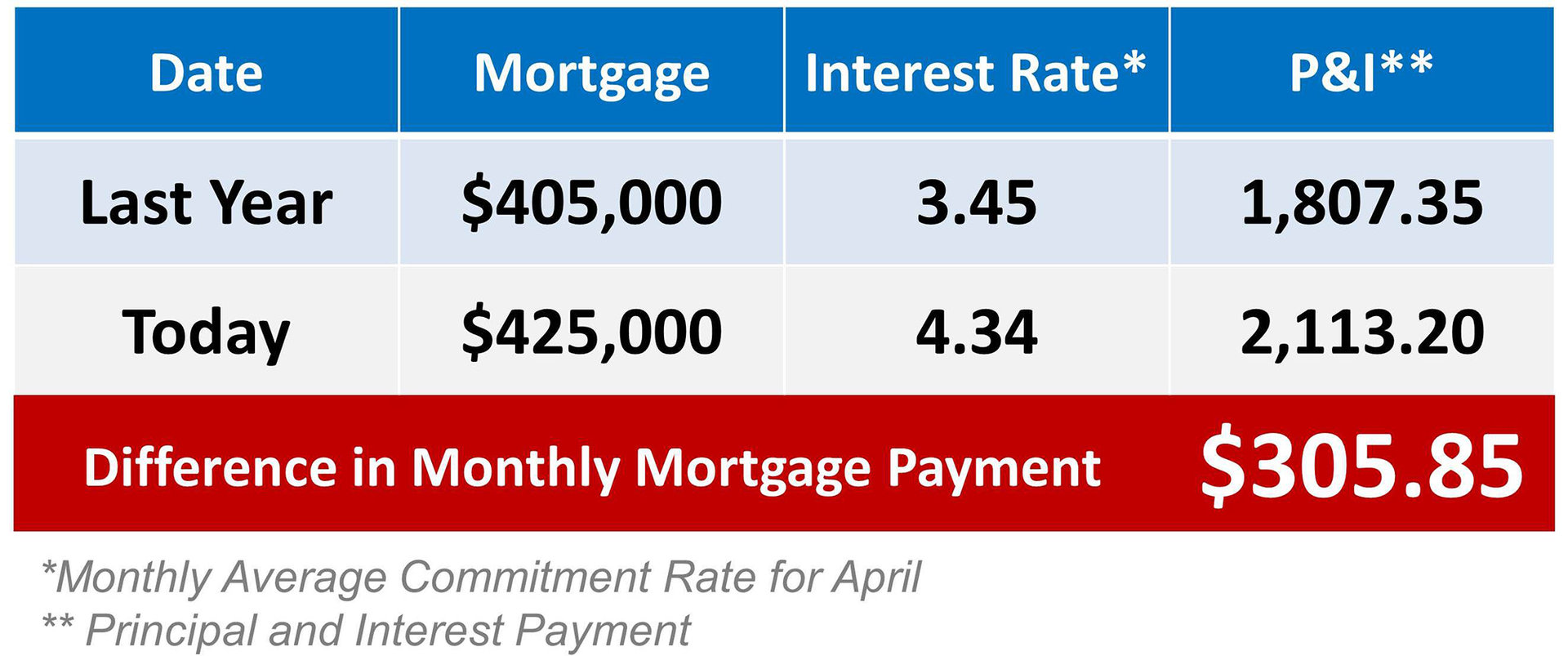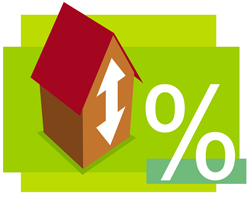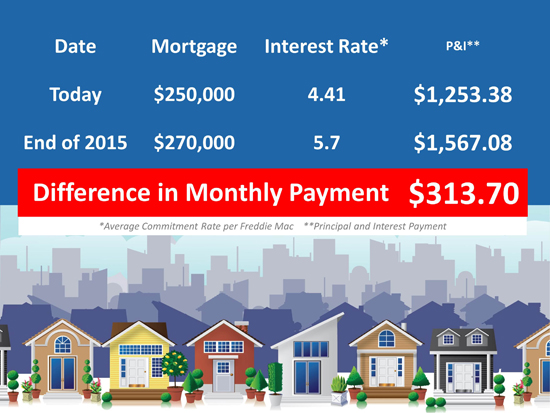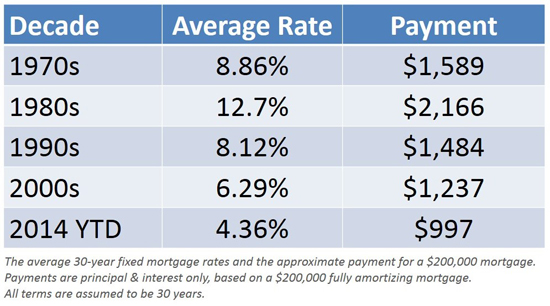stdClass Object
(
[agents_bottom_line] =>  Many experts are currently discussing a variety of topics such as real estate as an investment, the movement on mortgage interest rates and reasons to buy now instead of waiting. It is important that we realize that this does not apply solely to the first time home buyer.
The opportunity that exists in real estate today is there for everyone.
However, the family that already owns a home might be thinking that, if they wait, their home could be worth more next year than it is now. And that may cause them to delay moving up to the home of their dreams thinking it makes good financial sense. Actually, the opposite is true. This is the best chance a family has to buy up into the home that makes sense for their family right now.
We must realize that whatever percentage of value we gain on our house will also be gained on our dream home.
Let’s assume your current home is worth $500,000. Your house will be worth $520,000 next year if prices rise by 4% over that time (a number projected by the Home Price Expectation Survey).
However, the $750,000 home you are hoping to move into will also appreciate by about that same 4%. That means next year it will be valued at $780,000. You wouldn’t make $20,000 by waiting. You would actually be losing $10,000 ($30,000 - $20,000).
And, you will pay a lower interest rate on the mortgage than you probably will next year.
Plug in the numbers that apply to your house and the home you are longing to buy and see what the bottom line turns out to be for you.
That is how wealth is built in this country - by purchasing real estate at the right time, at the right price and at the right terms.
Go out and find your family's dream house and buy it! Ten years from now, you will be glad you did!
[assets] => Array
(
)
[can_share] => no
[categories] => Array
(
[0] => stdClass Object
(
[category_type] => standard
[children] =>
[created_at] => 2019-06-03T18:18:43Z
[id] => 5
[name] => For Buyers
[parent] =>
[parent_id] =>
[published_at] => 2019-06-03T18:18:43Z
[slug] => buyers
[status] => public
[translations] => stdClass Object
(
[es] => stdClass Object
(
[name] => Para los compradores
)
)
[updated_at] => 2019-06-03T18:18:43Z
)
)
[content_type] => blog
[contents] =>
Many experts are currently discussing a variety of topics such as real estate as an investment, the movement on mortgage interest rates and reasons to buy now instead of waiting. It is important that we realize that this does not apply solely to the first time home buyer.
The opportunity that exists in real estate today is there for everyone.
However, the family that already owns a home might be thinking that, if they wait, their home could be worth more next year than it is now. And that may cause them to delay moving up to the home of their dreams thinking it makes good financial sense. Actually, the opposite is true. This is the best chance a family has to buy up into the home that makes sense for their family right now.
We must realize that whatever percentage of value we gain on our house will also be gained on our dream home.
Let’s assume your current home is worth $500,000. Your house will be worth $520,000 next year if prices rise by 4% over that time (a number projected by the Home Price Expectation Survey).
However, the $750,000 home you are hoping to move into will also appreciate by about that same 4%. That means next year it will be valued at $780,000. You wouldn’t make $20,000 by waiting. You would actually be losing $10,000 ($30,000 - $20,000).
And, you will pay a lower interest rate on the mortgage than you probably will next year.
Plug in the numbers that apply to your house and the home you are longing to buy and see what the bottom line turns out to be for you.
That is how wealth is built in this country - by purchasing real estate at the right time, at the right price and at the right terms.
Go out and find your family's dream house and buy it! Ten years from now, you will be glad you did!
[assets] => Array
(
)
[can_share] => no
[categories] => Array
(
[0] => stdClass Object
(
[category_type] => standard
[children] =>
[created_at] => 2019-06-03T18:18:43Z
[id] => 5
[name] => For Buyers
[parent] =>
[parent_id] =>
[published_at] => 2019-06-03T18:18:43Z
[slug] => buyers
[status] => public
[translations] => stdClass Object
(
[es] => stdClass Object
(
[name] => Para los compradores
)
)
[updated_at] => 2019-06-03T18:18:43Z
)
)
[content_type] => blog
[contents] =>  Many experts are currently discussing a variety of topics such as real estate as an investment, the movement on mortgage interest rates and reasons to buy now instead of waiting. It is important that we realize that this does not apply solely to the first time home buyer.
The opportunity that exists in real estate today is there for everyone.
However, the family that already owns a home might be thinking that, if they wait, their home could be worth more next year than it is now. And that may cause them to delay moving up to the home of their dreams thinking it makes good financial sense. Actually, the opposite is true. This is the best chance a family has to buy up into the home that makes sense for their family right now.
We must realize that whatever percentage of value we gain on our house will also be gained on our dream home.
Let’s assume your current home is worth $500,000. Your house will be worth $520,000 next year if prices rise by 4% over that time (a number projected by the Home Price Expectation Survey).
However, the $750,000 home you are hoping to move into will also appreciate by about that same 4%. That means next year it will be valued at $780,000. You wouldn’t make $20,000 by waiting. You would actually be losing $10,000 ($30,000 - $20,000).
And, you will pay a lower interest rate on the mortgage than you probably will next year.
Plug in the numbers that apply to your house and the home you are longing to buy and see what the bottom line turns out to be for you.
That is how wealth is built in this country - by purchasing real estate at the right time, at the right price and at the right terms.
Go out and find your family's dream house and buy it! Ten years from now, you will be glad you did!
[created_at] => 2014-05-28T06:00:58Z
[description] =>
Many experts are currently discussing a variety of topics such as real estate as an investment, the movement on mortgage interest rates and reasons to buy now instead of waiting. It is important that we realize that this does not apply solely to ...
[expired_at] =>
[featured_image] => https:///
[id] => 51
[published_at] => 2014-05-28T10:00:58Z
[related] => Array
(
)
[slug] => create-wealth-move-up-now
[status] => published
[tags] => Array
(
)
[title] => Create Wealth: Move Up Now!!
[updated_at] => 2014-05-21T15:25:51Z
[url] => /2014/05/28/create-wealth-move-up-now/
)
Many experts are currently discussing a variety of topics such as real estate as an investment, the movement on mortgage interest rates and reasons to buy now instead of waiting. It is important that we realize that this does not apply solely to the first time home buyer.
The opportunity that exists in real estate today is there for everyone.
However, the family that already owns a home might be thinking that, if they wait, their home could be worth more next year than it is now. And that may cause them to delay moving up to the home of their dreams thinking it makes good financial sense. Actually, the opposite is true. This is the best chance a family has to buy up into the home that makes sense for their family right now.
We must realize that whatever percentage of value we gain on our house will also be gained on our dream home.
Let’s assume your current home is worth $500,000. Your house will be worth $520,000 next year if prices rise by 4% over that time (a number projected by the Home Price Expectation Survey).
However, the $750,000 home you are hoping to move into will also appreciate by about that same 4%. That means next year it will be valued at $780,000. You wouldn’t make $20,000 by waiting. You would actually be losing $10,000 ($30,000 - $20,000).
And, you will pay a lower interest rate on the mortgage than you probably will next year.
Plug in the numbers that apply to your house and the home you are longing to buy and see what the bottom line turns out to be for you.
That is how wealth is built in this country - by purchasing real estate at the right time, at the right price and at the right terms.
Go out and find your family's dream house and buy it! Ten years from now, you will be glad you did!
[created_at] => 2014-05-28T06:00:58Z
[description] =>
Many experts are currently discussing a variety of topics such as real estate as an investment, the movement on mortgage interest rates and reasons to buy now instead of waiting. It is important that we realize that this does not apply solely to ...
[expired_at] =>
[featured_image] => https:///
[id] => 51
[published_at] => 2014-05-28T10:00:58Z
[related] => Array
(
)
[slug] => create-wealth-move-up-now
[status] => published
[tags] => Array
(
)
[title] => Create Wealth: Move Up Now!!
[updated_at] => 2014-05-21T15:25:51Z
[url] => /2014/05/28/create-wealth-move-up-now/
)
Create Wealth: Move Up Now!!
Many experts are currently discussing a variety of topics such as real estate as an investment, the movement on mortgage interest rates and reasons to buy now instead of waiting. It is important that we realize that this does not apply solely to ...

 A recent
A recent 

 Today, many real estate conversations center on housing prices and where they may be headed. That is why the Home Price Expectation Survey is a great barometer. Every quarter, Pulsenomics surveys a nationwide panel of over one hundred economists, real estate experts and investment & market strategists about where prices are headed over the next five years. They then average the projections of all 100+ experts into a single number.
The results of their latest survey
Today, many real estate conversations center on housing prices and where they may be headed. That is why the Home Price Expectation Survey is a great barometer. Every quarter, Pulsenomics surveys a nationwide panel of over one hundred economists, real estate experts and investment & market strategists about where prices are headed over the next five years. They then average the projections of all 100+ experts into a single number.
The results of their latest survey
 Do as I Say… not as I Do
Do as I Say… not as I Do The Hispanic community was hit hardest by the housing crash. Now that the market is recovering, many of these families have the opportunity to either buy a home again, or those that lost home value during those years, are seeing equity return allowing them to sell and move to the home that they always wanted.
These buyers are ready, but according to a recent survey done by NAHREP (the National Association of Hispanic Real Estate Professionals) there are barriers that do not allow these buyers to enter the market right now. As real estate professionals is our duty to remove some of these barriers, if possible, and help as many families as we can become homeowners if they are willing ready and able to.
The Hispanic community is becoming a very important part of today’s real estate market, “The number of Hispanic households has grown to 14.7 million in 2013 and today a Hispanic youth turns 18 every minute of every day,” according to the 2013 State of Hispanic Homeownership Report.
4 out of 10 new households in the United States are expected to be Hispanic in 2014, this is a major opportunity for real estate professionals.
[assets] => Array
(
)
[can_share] => no
[categories] => Array
(
[0] => stdClass Object
(
[category_type] => standard
[children] =>
[created_at] => 2019-06-03T18:18:43Z
[id] => 1
[name] => Uncategorized
[parent] =>
[parent_id] =>
[published_at] => 2019-06-03T18:18:43Z
[slug] => uncategorized
[status] => public
[translations] => stdClass Object
(
[es] => stdClass Object
(
[name] => No clasificado
)
)
[updated_at] => 2019-06-03T18:18:43Z
)
)
[content_type] => blog
[contents] =>
The Hispanic community was hit hardest by the housing crash. Now that the market is recovering, many of these families have the opportunity to either buy a home again, or those that lost home value during those years, are seeing equity return allowing them to sell and move to the home that they always wanted.
These buyers are ready, but according to a recent survey done by NAHREP (the National Association of Hispanic Real Estate Professionals) there are barriers that do not allow these buyers to enter the market right now. As real estate professionals is our duty to remove some of these barriers, if possible, and help as many families as we can become homeowners if they are willing ready and able to.
The Hispanic community is becoming a very important part of today’s real estate market, “The number of Hispanic households has grown to 14.7 million in 2013 and today a Hispanic youth turns 18 every minute of every day,” according to the 2013 State of Hispanic Homeownership Report.
4 out of 10 new households in the United States are expected to be Hispanic in 2014, this is a major opportunity for real estate professionals.
[assets] => Array
(
)
[can_share] => no
[categories] => Array
(
[0] => stdClass Object
(
[category_type] => standard
[children] =>
[created_at] => 2019-06-03T18:18:43Z
[id] => 1
[name] => Uncategorized
[parent] =>
[parent_id] =>
[published_at] => 2019-06-03T18:18:43Z
[slug] => uncategorized
[status] => public
[translations] => stdClass Object
(
[es] => stdClass Object
(
[name] => No clasificado
)
)
[updated_at] => 2019-06-03T18:18:43Z
)
)
[content_type] => blog
[contents] =>  Eric Belsky is Managing Director of the Joint Center of Housing Studies at Harvard University. He also currently serves on the editorial board of the Journal of Housing Research and Housing Policy Debate. Last year he released a paper on homeownership -
Eric Belsky is Managing Director of the Joint Center of Housing Studies at Harvard University. He also currently serves on the editorial board of the Journal of Housing Research and Housing Policy Debate. Last year he released a paper on homeownership -  Growing up it seemed ‘white lies’ were okay while lying was a sin. As children, we sometimes had difficulty understanding where the line was. As we matured, we realized there most definitely was a difference.
Growing up it seemed ‘white lies’ were okay while lying was a sin. As children, we sometimes had difficulty understanding where the line was. As we matured, we realized there most definitely was a difference. I have been a subscriber to the Wall Street Journal (WSJ) for as long as I can remember. In my opinion, it is the single greatest source of financial information and insights available. I don’t always agree with their analysis but I always respect their position.
However, in an article this past weekend,
I have been a subscriber to the Wall Street Journal (WSJ) for as long as I can remember. In my opinion, it is the single greatest source of financial information and insights available. I don’t always agree with their analysis but I always respect their position.
However, in an article this past weekend,  Someone said to me recently, “Sixty-five is the new forty-five.” We chuckled, but the more I thought about it, the more I found myself in full agreement.
With more and more people working beyond traditional retirement age and the advances in modern medicine, the lines between middle and late adulthood are becoming a bit blurred.
Someone said to me recently, “Sixty-five is the new forty-five.” We chuckled, but the more I thought about it, the more I found myself in full agreement.
With more and more people working beyond traditional retirement age and the advances in modern medicine, the lines between middle and late adulthood are becoming a bit blurred.
 In a
In a  In a recent
In a recent  This month the National Association of Hispanic Real Estate Professionals (NAHREP) released their annual State of Hispanic Homeownership Report for 2013. A 35 page report designed to highlight “the homeownership growth and household formation rates of Hispanics as well as their educational achievements, entrepreneurial endeavors, labor force profile, and purchasing power in the United States”.
This report is full of great information and you should
This month the National Association of Hispanic Real Estate Professionals (NAHREP) released their annual State of Hispanic Homeownership Report for 2013. A 35 page report designed to highlight “the homeownership growth and household formation rates of Hispanics as well as their educational achievements, entrepreneurial endeavors, labor force profile, and purchasing power in the United States”.
This report is full of great information and you should  If you read certain headlines, you might be led to believe that the housing recovery has come to a screeching halt. Naysayers are claiming that rising mortgage rates and a lack of consumer confidence are keeping Americans on the fence when it comes to purchasing real estate. That is actually far from reality.
After all 12,575 houses sold yesterday, 12,575 will sell today and 12,575 will sell tomorrow. 12,575!
That is the average number of homes that sell each and every day in this country according to the National Association of Realtors’ (NAR) latest Existing Home Sales Report. According to the report, annualized sales now stand at 4.59 million. Divide that number by 365 (days in a year) and we can see that, on average, over 12,500 homes sell every day.
If you are considering whether or not to put your house up for sale, don't let the headlines scare you. There are purchasers in the market and they are buying - to the tune of 12,575 homes a day.
[assets] => Array
(
)
[can_share] => no
[categories] => Array
(
[0] => stdClass Object
(
[category_type] => standard
[children] =>
[created_at] => 2019-06-03T18:18:43Z
[id] => 6
[name] => For Sellers
[parent] =>
[parent_id] =>
[published_at] => 2019-06-03T18:18:43Z
[slug] => sellers
[status] => public
[translations] => stdClass Object
(
[es] => stdClass Object
(
[name] => Para los vendedores
)
)
[updated_at] => 2019-06-03T18:18:43Z
)
)
[content_type] => blog
[contents] =>
If you read certain headlines, you might be led to believe that the housing recovery has come to a screeching halt. Naysayers are claiming that rising mortgage rates and a lack of consumer confidence are keeping Americans on the fence when it comes to purchasing real estate. That is actually far from reality.
After all 12,575 houses sold yesterday, 12,575 will sell today and 12,575 will sell tomorrow. 12,575!
That is the average number of homes that sell each and every day in this country according to the National Association of Realtors’ (NAR) latest Existing Home Sales Report. According to the report, annualized sales now stand at 4.59 million. Divide that number by 365 (days in a year) and we can see that, on average, over 12,500 homes sell every day.
If you are considering whether or not to put your house up for sale, don't let the headlines scare you. There are purchasers in the market and they are buying - to the tune of 12,575 homes a day.
[assets] => Array
(
)
[can_share] => no
[categories] => Array
(
[0] => stdClass Object
(
[category_type] => standard
[children] =>
[created_at] => 2019-06-03T18:18:43Z
[id] => 6
[name] => For Sellers
[parent] =>
[parent_id] =>
[published_at] => 2019-06-03T18:18:43Z
[slug] => sellers
[status] => public
[translations] => stdClass Object
(
[es] => stdClass Object
(
[name] => Para los vendedores
)
)
[updated_at] => 2019-06-03T18:18:43Z
)
)
[content_type] => blog
[contents] =>  There is a great opportunity that exists now for Millennials who are willing and able to purchase a home NOW... Here are a couple other ways to look at the cost of waiting.
Let’s say you're 30 and your dream house costs $250,000 today, at 4.41% your monthly Mortgage Payment with Interest would be $1,253.38.
But you’re busy, you like your apartment, moving is such a hassle...You decide to wait till the end of next year to buy and all of a sudden, you’re 31, that same house is $270,000, at 5.7%. Your new payment per month is $1,567.08.
There is a great opportunity that exists now for Millennials who are willing and able to purchase a home NOW... Here are a couple other ways to look at the cost of waiting.
Let’s say you're 30 and your dream house costs $250,000 today, at 4.41% your monthly Mortgage Payment with Interest would be $1,253.38.
But you’re busy, you like your apartment, moving is such a hassle...You decide to wait till the end of next year to buy and all of a sudden, you’re 31, that same house is $270,000, at 5.7%. Your new payment per month is $1,567.08.
 We have never hid our belief in homeownership. That does not mean we think EVERYONE should run out and buy a house. However, if a person or family is ready, willing and able to purchase a home, we believe that owning is much better than renting. And we believe that now is a great time to buy.
We are not the only ones that think owning has massive benefits or that now is a sensational time to plunge into owning your own home. Here are a few others:
We have never hid our belief in homeownership. That does not mean we think EVERYONE should run out and buy a house. However, if a person or family is ready, willing and able to purchase a home, we believe that owning is much better than renting. And we believe that now is a great time to buy.
We are not the only ones that think owning has massive benefits or that now is a sensational time to plunge into owning your own home. Here are a few others:
 We have often talked about the difference between COST and PRICE. As a seller, you will be most concerned about ‘short term price’ – where home values are headed over the next six months. As either a first time or repeat buyer, you must not be concerned about price but instead about the ‘long term cost’ of the home. Let us explain.
Recently, we
We have often talked about the difference between COST and PRICE. As a seller, you will be most concerned about ‘short term price’ – where home values are headed over the next six months. As either a first time or repeat buyer, you must not be concerned about price but instead about the ‘long term cost’ of the home. Let us explain.
Recently, we 
 Millennials have become an important topic of discussion for media outlets and blogs throughout the Country. While some argue that my generation is blossoming later than our predecessors, optimists such as myself believe that with our rebounding economy will help Millennials finally arrive in the economic arena that allows them the growth potential generations before us were afforded.
While I truly believe Millennials are positioned to become an important force in the new economy, the widening economic policy that minimizes retirement accounts and creates underemployment of Millennials threatens what is now America’s largest demographic.
Millennials have become an important topic of discussion for media outlets and blogs throughout the Country. While some argue that my generation is blossoming later than our predecessors, optimists such as myself believe that with our rebounding economy will help Millennials finally arrive in the economic arena that allows them the growth potential generations before us were afforded.
While I truly believe Millennials are positioned to become an important force in the new economy, the widening economic policy that minimizes retirement accounts and creates underemployment of Millennials threatens what is now America’s largest demographic.
 Nielsen recently released their report “
Nielsen recently released their report “ A recent
A recent  "One thing seems certain: we aren't likely to see average 30-year fixed mortgage rates return to the historic lows experienced in 2012."
- Freddie Mac, March 24, 2014
There are those that hope that 30-year mortgage interest rates will head back under 4%. Obviously, for any prospective home purchaser that would be great news. However, there is probably a greater chance that interest rates will return to the greater than 6% rate of the last decade before they would return to the less than 3.5% rate of 2012.
Freddie Mac, in one of four original posts on their
"One thing seems certain: we aren't likely to see average 30-year fixed mortgage rates return to the historic lows experienced in 2012."
- Freddie Mac, March 24, 2014
There are those that hope that 30-year mortgage interest rates will head back under 4%. Obviously, for any prospective home purchaser that would be great news. However, there is probably a greater chance that interest rates will return to the greater than 6% rate of the last decade before they would return to the less than 3.5% rate of 2012.
Freddie Mac, in one of four original posts on their 
 Eric Belsky is Managing Director of the Joint Center of Housing Studies at Harvard University. He also currently serves on the editorial board of the Journal of Housing Research and Housing Policy Debate. This year he released a new paper on homeownership -
Eric Belsky is Managing Director of the Joint Center of Housing Studies at Harvard University. He also currently serves on the editorial board of the Journal of Housing Research and Housing Policy Debate. This year he released a new paper on homeownership -  Several government agencies are reviewing data to determine what will be the minimum down payment required under the new Qualified Residential Mortgage (QRM) guidelines scheduled to be revealed in the next few months. In the original
Several government agencies are reviewing data to determine what will be the minimum down payment required under the new Qualified Residential Mortgage (QRM) guidelines scheduled to be revealed in the next few months. In the original 